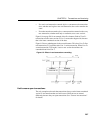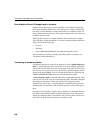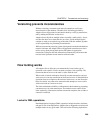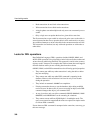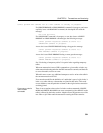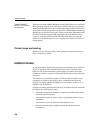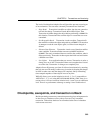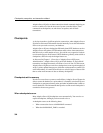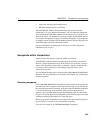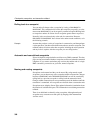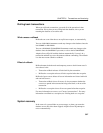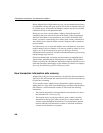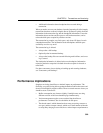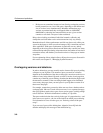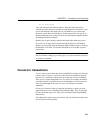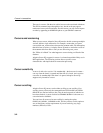
CHAPTER 8 Transactions and Versioning
305
• At the start and end of the backup process.
• When the database server is shut down.
The
CHECKPOINT_TIME is the maximum time that can pass between
checkpoints. It is set by default at 60 minutes. You can adjust the checkpoint
interval with the
SET OPTION command; see the Adaptive Server IQ Reference
Manual for details. You probably do not need to adjust the checkpoint time or
issue explicit checkpoints, however. Controlling checkpoints is less important
in Adaptive Server IQ than in OLTP database products, because IQ writes the
actual data pages after each transaction commits.
For more information on checkpoints in recovery, see “How transaction
information aids recovery”.
Savepoints within transactions
Adaptive Server IQ supports savepoints within a transaction.
A
SAVEPOINT statement defines an intermediate point during a transaction.
Because a single IQ transaction may write millions of rows of data, you may
want to limit the amount of data that is committed—and thus written to disk—
to less than a full transaction's worth. Setting savepoints allows you to
subdivide transactions.
You can undo all changes after a savepoint using a
ROLLBACK TO SAVEPOINT
statement. For more information on savepoints and rollback, see “Naming and
nesting savepoints”.
Releasing savepoints
Once a RELEASE SAVEPOINT statement has been executed or the transaction
has ended, you can no longer use the savepoint. Releasing a savepoint frees up
the version pages that have been used, up to that savepoint. Remember that data
is versioned at the page level internally. Adaptive Server IQ maintains a
separate copy of just the updated pages; the remaining pages are shared with
the previous version. By releasing savepoints, you free up the pages associated
with them, and thus make better use of your disk space.
Releasing savepoint n both releases all resources after that savepoint, and gives
up your ability to roll back to any intermediate savepoints.
No locks are released by the
RELEASE SAVEPOINT command.



